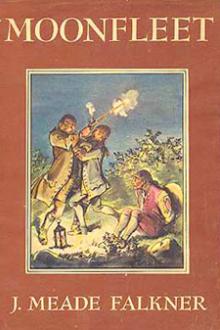Iron Throne - Ellen Gould-Harmon (best autobiographies to read .TXT) 📗

- Author: Ellen Gould-Harmon
Book online «Iron Throne - Ellen Gould-Harmon (best autobiographies to read .TXT) 📗». Author Ellen Gould-Harmon
Thus it was shown that Scripture gives no warrant for men to remain in ignorance concerning the nearness of Christ's coming. But those who desired only an excuse to reject the truth closed their ears to this explanation, and the words "No man knoweth the day nor the hour" continued to be echoed by the bold scoffer and even by the professed minister of Christ. As the people were roused, and began to inquire the way of salvation, religious teachers stepped in between them and the truth, seeking to quiet their fears by falsely interpreting the word of God. Unfaithful watchmen united in the work of the great deceiver, crying, Peace, peace, when God had not spoken peace. Like the Pharisees in Christ's day, many refused to enter the kingdom of heaven themselves, and those who were entering in they hindered. The blood of these souls will be required at their hand.
The most humble and devoted in the churches were usually the first to receive the message. Those who studied the Bible for themselves could not but see the unscriptural character of the popular views of prophecy; and wherever the people were not controlled by the influence of the clergy, wherever they would search the word of God for themselves, the advent doctrine needed only to be compared with the Scriptures to establish its divine authority. Many were persecuted by their unbelieving brethren. In order to retain their position in the church, some consented to be silent in regard to their hope; but others felt that loyalty to God forbade them thus to hide the truths which He had committed to their trust. Not a few were cut off from the fellowship of the church for no other reason than expressing their belief in the coming of Christ. Very precious to those who bore this trial of their faith were the words of the prophet: "Your brethren that hated you, that cast you out for My name's sake, said, Let the Lord be glorified: but He shall appear to your joy, and they shall be ashamed." Isaiah 66:5.
Angels of God were watching with the deepest interest the result of the warning. When there was a general rejection of the message by the churches, angels turned away in sadness. But there were many who had not yet been tested in regard to the advent truth. Many were misled by husbands, wives, parents, or children, and were made to believe it a sin even to listen to such heresies as were taught by the Adventists. Angels were bidden to keep faithful watch over these souls, for another light was yet to shine upon them from the throne of God.
With unspeakable desire those who had received the message watched for the coming of their Saviour. The time when they expected to meet Him was at hand. They approached this hour with a calm solemnity. They rested in sweet communion with God, and earnest of the peace that was to be theirs in the bright hereafter. None who experienced this hope and trust can forget those precious hours of waiting. For some weeks preceding the time, worldly business was for the most part laid aside. The sincere believers carefully examined every thought and emotion of their hearts as if upon their deathbeds and in a few hours to close their eyes upon earthly scenes. There was no making of "ascension robes" ; but all felt the need of internal evidence that they were prepared to meet the Saviour; their white robes were purity of soul--characters cleansed from sin by the atoning blood of Christ. Would that there were still with the professed people of God the same spirit of heart searching, the same earnest, determined faith. Had they continued thus to humble themselves before the Lord and press their petitions at the mercy seat they would be in possession of a far richer experience than they now have. There is too little prayer, too little real conviction of sin, and the lack of living faith leaves many destitute of the grace so richly provided by our Redeemer.
God designed to prove His people. His hand covered a mistake in the reckoning of the prophetic periods. Adventists did not discover the error, nor was it discovered by the most learned of their opponents. The latter said: "Your reckoning of the prophetic periods is correct. Some great event is about to take place; but it is not what Mr. Miller predicts; it is the conversion of the world, and not the second advent of Christ." The time of expectation passed, and Christ did not appear for the deliverance of His people. Those who with sincere faith and love had looked for their Saviour, experienced a bitter disappointment. Yet the purposes of God were being accomplished; He was testing the hearts of those professed to be waiting for His appearing. There were among them many who had been actuated by no higher motive than fear. Their profession of faith had not affected their hearts or their lives. When the expected event failed to take place, these persons declared that they were not disappointed; they had never believed that Christ would come. They were among the first to ridicule the sorrow of the true believers.
But Jesus and all the heavenly host looked with love and sympathy upon the tried and faithful yet disappointed ones. Could the evil separating the visible world have been swept back, angels would have been seen drawing near to these steadfast souls and shielding them from the shafts of Satan.
In preaching the doctrine of the second advent, William Miller and his associates had laboured with the sole purpose of arousing men to a preparation for the judgment. They had sought to awaken professors of religion to the true hope of the church and to their need of a deeper Christian experience, and they laboured also to awaken the unconverted to the duty of immediate repentance and conversion to God. "They made no attempt to convert men to a sect or party in religion. Hence they laboured among all parties and sects, without interfering with their organization or discipline."
"In all my labours," said Miller, "I never had the desire or thought to establish any separate interest from that of existing denominations, or to benefit one at the expense of another. I thought to benefit all. Supposing that all Christians would rejoice in the prospect of Christ's coming, and that those who could not see as I did would not love any the less those who should embrace this doctrine, I did not conceive there would ever be any necessity for separate meetings. My whole object was a desire to convert souls to God, to notify the world of a coming judgment, and to induce my fellow men to make that preparation of heart which will enable them to meet their God in peace. The great majority of those who were converted under my labours united with the various existing churches."-Bliss, page 328.
As his work tended to build up the churches, it was for a time regarded with favour. But as ministers and religious leaders decided against the advent doctrine and desired to suppress all agitation of the subject, they not only opposed it from the pulpit, but denied their members the privilege of attending preaching upon the second advent, or even of speaking of their hope in the social meetings of the church. Thus the believers found themselves in a position of great trial and perplexity. They loved their churches and were loath to separate from them; but as they saw the testimony of God's word suppressed and their right to investigate the prophecies denied they felt that loyalty to God forbade them to submit. Those who sought to shut out the testimony of God's word they could not regard as constituting the church of Christ, "the pillar and ground of the truth." Hence they felt themselves justified in separating from their former connection. In the summer of 1844 about fifty thousand withdrew from the churches.
About this time a marked change was apparent in most of the churches throughout the United States. There had been for many years a gradual but steadily increasing conformity to worldly practices and customs, and a corresponding decline in real spiritual life; but in that year there were evidences of a sudden and marked declension in nearly all the churches of the land. While none seemed able to suggest the cause, the fact itself was widely noted and commented upon by both the press and the pulpit. At a meeting of the presbytery of Philadelphia, Mr. Barnes, author of a commentary widely used and pastor of one of the leading churches in that city, "stated that he had been in the ministry for twenty years, and never, till the last Communion, had he administered the ordinance without receiving more or less into the church. But now there are no awakenings, no conversions, not much apparent growth in grace in professors, and none come to his study to converse about the salvation of their souls. With the increase of business, and the brightening prospects of commerce and manufacture, there is an increase of worldly-mindedness. Thus it is with all the denominations." -- Congregational Journal, May 23, 1844.
In the month of February of the same year, Professor Finney of Oberlin College said: "We have had the fact before our minds, that, in general, the Protestant churches of our country, as such, were either apathetic or hostile to nearly all the moral reforms of the age. There are partial exceptions, yet not enough to render the fact otherwise than general. We have also another corroborated fact: the almost universal absence of revival influence in the churches. The spiritual apathy is almost all-pervading, and is fearfully deep; so the religious press of the whole land testifies. . . . Very extensively, church members are becoming devotees of fashion, --join hands with the ungodly in parties of pleasure, in dancing, in festivities, etc. . . . But we need not expand this painful subject. Suffice it that the evidence thickens and rolls heavily upon us, to show that the churches generally are becoming sadly degenerate . They have gone very far from the Lord, and He has withdrawn Himself from them."
And a writer in the Religious Telescope testified: "We have never witnessed such a general declension of religion as at the present. Truly, the church should awake, and search into the cause of this affliction; for as an affliction everyone that loves Zion must view it. When we call to mind how 'few and far between' cases of true conversion are, and the almost unparalleled impertinence and hardness of sinners, we almost involuntarily exclaim, 'Has God forgotten to be gracious? or, Is the door of mercy closed?'" Such a condition never exists without cause in the church itself. The spiritual darkness which falls upon nations, upon churches and individuals, is due, not to an arbitrary withdrawal of the succors of divine grace on the part of God, but to neglect or rejection of divine light on the part of men. A striking illustration of this truth is presented in the history of the Jewish people in the time of Christ. By their devotion to the world and forgetfulness of God and His word, their understanding had become darkened, their hearts earthly and sensual. Thus they were in ignorance concerning Messiah's advent, and in their pride and unbelief they rejected the Redeemer. God did not even then cut off the Jewish nation from a knowledge of, or a participation in, the blessings of salvation. But those who rejected the truth lost all desire for the gift of Heaven. They had "put darkness for light, and light for darkness," until the light which was in them became darkness; and how





Comments (0)